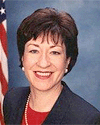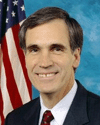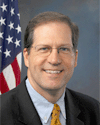| Jan. 24 | |
| Projected Senate will go here |
|
The Republicans have 23 seats at stake in 2008 and the Democrats have just 12. Nevertheless, many of these are safe seats, so the numbers don't tell the whole story. Below are the races expected to be competitive. However, potential retirements in half a dozen states could easily change the picture. See also our list of all 2008 Senate races and also the hottest 2008 House races.
Alaska
| Incumbent | Challenger | Notes |

Ted Stevens (R) |

(D) |
If you Google "The bridge to nowhere" you will find over 50,000 hits, all of them describing Ted Stevens' pet project of spending $320 million of the taxpayers money to build a bridge from Ketchikan (pop. 8900) to its airport, to spare its residents a $6 ferry ride. Outside of Alaska he is the poster boy for pork barrel legislation gone berserk, but within the state he is seen as the guy who is trying to bring home the bacon. Stevens has served longer in the Senate than any Republican ever, which is good, but will be 91 at the end of his next term, which is bad for such a young state. In July 2007, the FBI and IRS raided his home as part of a corruption probe. This event launched a small war between Rep. Chris Van Hollen (D-MD), chairman of the DCCC and Sen. Chuck Schumer (D-NY), chairman of the DSCC. Both of them want Anchorage mayor Mark Begich to run for Congress, only Schumer wants him to challenge the badly weakened Stevens and Van Hollen wants him to run for the House against Rep. Don Young (R-AK), who is also under investigation for corruption. Another sign of Stevens' vulnerability is that he has a primary challenger, wealthy real estate developer David Cuddy. |
Colorado
| Challenger | Challenger | Notes |

Bob Schaffer (R) |

Mark Udall (D) |
When he was first elected in 1996, Sen. Wayne Allard (R-CO) promised to serve only two terms. True to his word, he has announced he will not run for a third term. Colorado has been trending Democratic in recent years. While George Bush carried the state by 6% in 2004, Colorado also elected Ken Salazar (D) to the Senate the same year and just elected Bill Ritter (D) governor by 15%. Furthermore, the Democrats control both houses of the state legislature. Colorado will be the Democrats' number 1 target in 2008. Rep. Mark Udall has announced he is running and unlikely to be challenged in a primary. He has a very strong environmental record in this environmentally conscious state. The most likely Republican is former Rep. Bob Schaffer. Schaffer ran for the Senate in 2004 but lost to Pete Coors in the Republican primary. |
Louisiana
| Incumbent | Challenger | Notes |

Mary Landrieu (D) |

John Kennedy (R) |
Mary Landrieu is one of the two Democrats who barely squeaked by in 2002, having won in a runoff with 52%. The Republicans have her in their crosshairs. They might try to blame hurricane Katrina on her (or more specifically, her response to it), but that would be playing with fire as she would would likely then blame the Republican administration. Her net approval rating is +10%--not great--so this is one of the Republicans best chances for a pickup. Her worst problem is that hundreds of thousands of people, most of them Democrats, left the state after the hurricane. Her likely opponent is state treasurer John Kennedy, who recently switched from the Democratic party to the Republican party to run against Landrieu. Landrieu trivia: Her father, Moon Landrieu, was mayor of New Orleans from 1970 to 1978, and her brother is the current Lt. Governor of Louisiana. |
Maine
| Incumbent | Challenger | Notes |

Susan Collins (R) |

Tom Allen (D) |
Sen. Susan Collins (R-ME) represents a dying breed: moderate Republicans from the Northeast. New England used to be run by them, but they have suffered major losses in recent years. Collins is personally popular, but so was Sen. Lincoln Chafee (R-RI), and it didn't save him. Also working against Collins is her 1996 pledge to serve only two terms, something she repeated in 2002. She recently decided to break that promise and run for a third term. Her opponent, Rep. Tom Allen from ME-01 (who already represents half the state in the House), will undoubtedly harp on the broken promise. This seat will be very competitive. |
Minnesota
| Incumbent | Challenger | Notes |

Norm Coleman (R) |

(D) |
Sen. Norm Coleman (R-MN) will be the Democrats number two target in the Senate in 2008. He won his seat in 2002 by a tiny margin after his Democratic opponent, Paul Wellstone, was killed in a plane crash two weeks before the election. The Democrats hastily got former Vice President Walter Mondale to take Wellstone's slot on the ticket, but Mondale was unable to do what Frank Lautenberg pulled off in New Jersey--suddenly jump in and win. Both parties are keenly aware that in Nov. 2006, Hennepin County Attorney Amy Klobuchar (D) crushed Rep. Mark Kennedy (R) by over 20% for an open Senate seat. |
New Hampshire
| Incumbent | Challenger | Notes |

John Sununu (R) |

Jeanne Shaheen (D) |
Sen. John Sununu (R-NH) had not really been on the radar until Nov. 7, 2006, when a political tsunami hit New Hampshire. Gov. John Lynch (D) was reelected with the largest margin in state gubernatorial history at the same time two unknown Democrats knocked off the state's two Republican House members. The Democrats also swept to power in both houses of the state legislature for the first time since 1874. In this environment, the rematch between three-time governor Jeanne Shaheen (D) and Sununu is likely to be very different than Sununu's 2002 4% victory over Shaheen. Early polling gives Shaheen a 15-20% lead. Sununu has the additional burder of being a strong supporter of the war in Iraq, a highly unpopular position in New Hampshire. At this point, the seat leans Democratic. Sununu trivia: Sununu is the youngest member of the Senate and his father was governor of New Hampshire and Bush 41's chief of staff. |
New Mexico
| Challenger | Challenger | Notes |

(R) |

Tom Udall (D) |
New Mexico is truly a swing state. In presidential races, it is split right down the middle. It also has one Democratic senator (Jeff Bingaman) who wins in landslides and one Republican senator (Pete Domenici) who wins in landslides. Under normal conditions, Domenici would be a shoo-in for a seventh term, but in Oct. he announced his retirement due to brain disease. Two Republican members of the House, Heather Wilson and Steve Pearce, want the nomination, so there will be a bruising primary. On the Democratic side, Rep. Tom Udall (cousin of Mark in Colorado) is the likely candidate. This means that all three of New Mexico's congressional seats will be open. However, only NM-01 (Wilson's seat) is in a swing district. Pearce's district is R+6 and Udall's is D+6. Also, if Bill Richardson's presidential campaign crashes and burns, he has until Feb. 12, 2008 to file for the Senate. |
North Carolina
| Incumbent | Challenger | Notes |

Elizabeth Dole (R) |

(D) |
Sen. Liddy Dole (R-NC) did a spectacularly bad job as head of the NRSC recruiting strong senatorial candidates to challenge weak Democratic senators, such as the Nelson boys. Will the people of North Carolina blame her for losing the Senate? Probably not since most people (except politicians and political junkies) have never even heard of the NRSC. She won by 9% in 2002 and has a +20% net approval rating, so if she decides to stay she has a decent shot at it unless the Democrats can recruit a strong challenger. Two relatively unknown Democrats, state senator Kay Hagan, and wealthy businessman Jim Neal, have announced they are running. Dole trivia: Her husband was a long-time senator from Kansas and the losing Republican presidential candidate in 1996. Then he switched from elections to erections and became the national spokesman for Viagra. |
Oregon
| Incumbent | Challenger | Notes |

Gordon Smith (R) |

Jeff Merkley (D) |
Sen. Gordon Smith (R-OR) is a moderate senator in a state that is trending Democratic. Although he won by 16% in 2002, his net approval rating is only 11%. While he has a fair shot at being reelected, his likely opponent, state House speaker, Jeff Merkley (D), could run the same campaign against him that Sen. Sheldon Whitehouse (D-RI) ran against former senator Lincoln Chafee (R) in Rhode Island: "Smith is a nice guy but do you want Mitch McConnell to be majority leader?" Merkley has an unknown primary opponent who will be defeated easily if he does not drop out first. This seat is definitely a Democratic priority. |
South Dakota
| Incumbent | Challenger | Notes |

Tim Johnson (D) |

(R) |
Tim Johnson is one of the two most endangered Democratic senators. He got just 50% of the vote in 2002 against John Thune, who ran again in 2004 and beat Tom Daschle. Furthermore, South Dakota is a heavily Republican state. Despite his narrow win in 2002, Johnson has a +46% net approval rating, so the people of South Dakota like the way he is doing his job. Unfortunately, Johnson suffered a cerebral hemorrhage Dec. 13, 2006. He was operated on immediately and is now recovering. All signs show that he intends to run for reelection in 2008. While he is in no condition to campaign now, a group of his (Democratic) friends in the Senate have begun holding fundraisers for him, so when he is ready to hit the campaign trail, he will have plenty of money. All this puts potential Republican candidates in a bind. Actively campaigning against a very popular senator who had a stroke makes them look mean. If Gov. Mike Rounds runs, it will be a real horse race; if Rounds declines, Johnson will be reelected as the GOP bench is thin here. |
Virginia
| Challenger | Challenger | Notes |

Jim Gilmore (R) |

Mark Warner (D) |
Sen. John Warner (R-VA) has decided to retire after his term is over in Jan. 2009. Former governor Mark Warner (D) is the Democratic nominee. Warner is young, attractive, and made about $200 million as a cell phone entrepreneur, so he can finance the campaign himself. The only announced Republican so far is former governor Jim Gilmore. troublesome for the GOP is that the Northern Virginia suburbs, which are heavily Democratic, are growing rapidly and led to the election of Jim Webb (D) as senator in 2006 and Tim Kaine (D) as governor in 2005. Warner's retirement has suddenly made Virginia a likely Democratic pickup in the Senate. Even though the last Democratic presidential candidate to carry Virginia was Lyndon Johnson, due to the changing demographics, in 2008 it will be a huge battleground. |
Back to the main page.